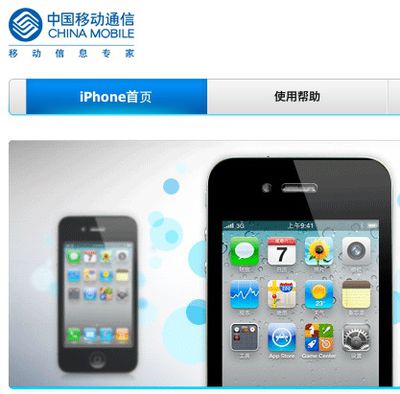China Mobile Hits 15 Million Unofficial iPhone Users as Apple Fixes iPhone 4S Signal Issues
China Mobile may be the world's largest carrier with over 650 million customers, but it is not yet an official iPhone carrier, due in part to unique technology used for its 3G network that would so far have forced Apple to build special hardware to be compatible with the carrier.
But that hasn't stopped the carrier from supporting the iPhone for its customers to use on its 2G network, and Tech in Asia now reports on news from Beijing Daily sharing that China Mobile now has 15 million iPhone users. The milestone comes just over four months after the carrier reached 10 million iPhone users.

Despite the iPhone's popularity with China Mobile's customers, the device's potential there is undoubtedly barely being tapped, with advances in chip technology and the carrier's network meaning that future iPhones are likely to run on its fastest 4G LTE networks without requiring unique hardware.
Even iPhone 4S users trying to use the device on China Mobile's 2G network have been experiencing difficulties with SIM card activation, but Beijing Daily reports (via The Next Web) that the issue has now been resolved by Apple despite the fact that China Mobile is not an official carrier for the device.
Apple Inc. may release an IOS update specifically for the Chinese mainland in early March to resolve the signal problems plaguing iPhone 4S owners using China Mobile’s network.
China Mobile said that Apple had updated the system of all iPhone 4S handsets manufactured after Feb. 8, 2012 to fully support its network, and will offer a software update for previously manufactured iPhone 4S handsets in early March.
The issue is reportedly related to the handling of two different frequency bands used by China Mobile's 2G GSM network, with iPhone 4S incompatibility with the E frequency band resulting in users being unable to connect to the network in areas served by that frequency band.
Popular Stories
Apple's next-generation iPhone 17 Pro and iPhone 17 Pro Max are less than three months away, and there are plenty of rumors about the devices.
Apple is expected to launch the iPhone 17, iPhone 17 Air, iPhone 17 Pro, and iPhone 17 Pro Max in September this year.
Below, we recap key changes rumored for the iPhone 17 Pro models:Aluminum frame: iPhone 17 Pro models are rumored to have an...
The long wait for an Apple Watch Ultra 3 appears to be nearly over, and it is rumored to feature both satellite connectivity and 5G support.
Apple Watch Ultra's existing Night Mode
In his latest Power On newsletter, Bloomberg's Mark Gurman said that the Apple Watch Ultra 3 is on track to launch this year with "significant" new features, including satellite connectivity, which would let you...
The upcoming iPhone 17 Pro and iPhone 17 Pro Max are rumored to have a slightly different MagSafe magnet layout compared to existing iPhone models, and a leaked photo has offered a closer look at the supposed new design.
The leaker Majin Bu today shared a photo of alleged MagSafe magnet arrays for third-party iPhone 17 Pro cases. On existing iPhone models with MagSafe, the magnets form a...
iOS 26 and iPadOS 26 add a smaller yet useful Wi-Fi feature to iPhones and iPads.
As spotted by Creative Strategies analyst Max Weinbach, sign-in details for captive Wi-Fi networks are now synced across iPhones and iPads running iOS 26 and iPadOS 26. For example, while Weinbach was staying at a Hilton hotel, his iPhone prompted him to fill in Wi-Fi details from his iPad that was already...
The iPhone 17 Pro Max will feature the biggest ever battery in an iPhone, according to the Weibo leaker known as "Instant Digital."
In a new post, the leaker listed the battery capacities of the iPhone 11 Pro Max through to the iPhone 16 Pro Max, and added that the iPhone 17 Pro Max will feature a battery capacity of 5,000mAh:
iPhone 11 Pro Max: 3,969mAh
iPhone 12 Pro Max: 3,687mAh...
Apple today seeded the second betas of upcoming iOS 18.6 and iPadOS 18.6 updates to public beta testers, with the betas coming just a day after Apple provided the betas to developers. Apple has also released a second beta of macOS Sequoia 15.6.
Testers who have signed up for beta updates through Apple's beta site can download iOS 18.6 and iPadOS 18.6 from the Settings app on a compatible...
Apple is developing a MacBook with the A18 Pro chip, according to findings in backend code uncovered by MacRumors.
Subscribe to the MacRumors YouTube channel for more videos.
Earlier today, Apple analyst Ming-Chi Kuo reported that Apple is planning to launch a low-cost MacBook powered by an iPhone chip. The machine is expected to feature a 13-inch display, the A18 Pro chip, and color options...




















